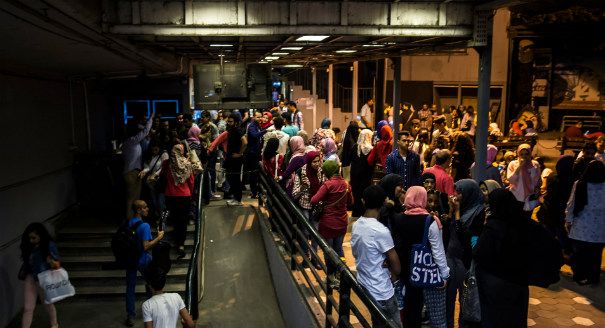On November 4, Sharm El Sheikh hosted the World Youth Forum, the sixth in a series of conferences Egypt has held since October 2016 intended to assure the national and international community that it is working tirelessly to build bridges of trust with Egyptian youth. For the latest World Youth Forum, President Abdel Fattah el-Sisi promoted the slogan “We need to talk,” promising to connect youth to policymakers so they can share their opinions and experience in development, civil society, and youth engagement—not merely on issues of entrepreneurship and development but also conflict resolution, women’s participation, and press freedom. Yet these high-profile events run in direct contrast to the Egyptian state’s own policies restricting free expression for youth, which build on the arsenal of laws and policies that aim to allow discussion only of what the regime wants to hear.
On October 24, marketing it as a “gift for the youth before the World Youth Forum,” the Egyptian parliament approved in principle the Youth Entities Act, which replaces Law 77 of 1975 on the National Associations for Youth and Sports Welfare. This law, once approved, will regulate and organize the governing bodies of youth sports clubs and their relationship with the state—but also what youth may or may not talk about in sports clubs. Article 6 of the draft law includes a new clause that prohibits clubs from engaging “in any political or partisan activity or promoting any political or partisan activity” or even “promoting any ideas or political objectives.” The penalty for discussing political ideas is “one year and 50,000 Egyptian pounds” ($2,800), according to Article 44 of the law.
Moreover, this legislation uses general and broad definitions that give authorities the greatest possible flexibility to use the legal text as they wish. For example, Article 6 of the draft law defines youth organizations as any that provide sports, social, health, recreational, or “other” services, allowing the executive branch to add any other institution—potentially including private universities—whenever it sees fit. MP Salah Hasaballah, the official spokesman for Tahya Misr, the largest bloc in parliament, said on October 24 that “the law prohibits partisan activities in sports clubs and universities,” although the law does not explicitly mention universities.
This builds on several years of laws, decrees, and court rulings that seek to eliminate all possible spaces for youth expression. In January 2015, Sisi issued a decree amending Article 110 of the Law 49 of 1972 on the Regulation of Universities, adding that any professor or lecturer at a public university will be fired for such violations “practicing partisan work within the university.” This ensures that even professors are not allowed to express their political positions or ideas. More recently, on October 26 the Supreme Council of Universities, part of the Ministry of Higher Education, issued a statement reiterating that there is no “partisan, political, or propaganda work within universities.” However, at the same time, this council allowed “To Build It,” a campaign calling on Sisi to run for a second term, to collect signatures from students at several universities. This follows a trend wherein the Egyptian state seeks to ban “partisan, political, or propaganda work” in any context—but in practice it only enforces such a ban selectively against political work that may be critical of the Egyptian state, while accepting all manner of openly partisan activity or propaganda that is supportive of the Sisi regime.
Outside the universities and sports clubs, only public places and the internet are left to Egyptian youth to express their ideas and beliefs, though these spaces are also subject to harsh restrictions. According to article 3 of the Egyptian Demonstration Law 107 of 2013, all Egyptians are prohibited from gathering together in groups of ten or more in a public place to express a political position without obtaining the prior approval of the Ministry of the Interior at least three days in advance. Although the law specifically applies to groups to ten or more, the Egyptian police used it in June 2016 to arrest one girl in Port Said who stood alone holding a sign reading, “Tiran and Sanafir are Egyptian,” in opposition to the agreement to transfer the islands to Saudi Arabia.
In addition, the Egyptian regime has expanded its repressive arsenal to ensure the silence of Egyptian youth on the Internet and social media. The regime has used Law 8 of 2015 on Terrorist Entities and Lists, which defines terrorist acts to include any that disturb “public order”—as well as Law 94 of 2015 on Combating Terrorism, which criminalizes such acts as indirectly promoting terrorism through written articles or public speaking—to imprison youth many times. This has most notably included the arrest on October 15 of Andrew Nasif, the first Christian imprisoned on terrorism charges, for comments on Facebook criticizing the economic policies of the regime and calling for greater political rights.
If the thirty years of repression under Hosni Mubarak are any guide, the continued prohibitions on young people from expressing their views and ideas will only draw youth to underground groups potentially violence ones that drive to radicalization. Several reports indicate that since the Demonstration Law was passed in 2015, many young Egyptians have already been radicalized, both inside and outside Egyptian prisons, because of the limited space for peaceful expression. Ultimately, false promises and propaganda campaigns such as the World Youth Forum, which try to tell the world that Egyptian youth are allowed and encouraged to talk, are deceitful and further alienate youth.
* This article was translated from Arabic.
Mahmoud Farouk is a program associate at the Project on Middle East Democracy (POMED). Follow him on Twitter @MahmoudFarouk06.





